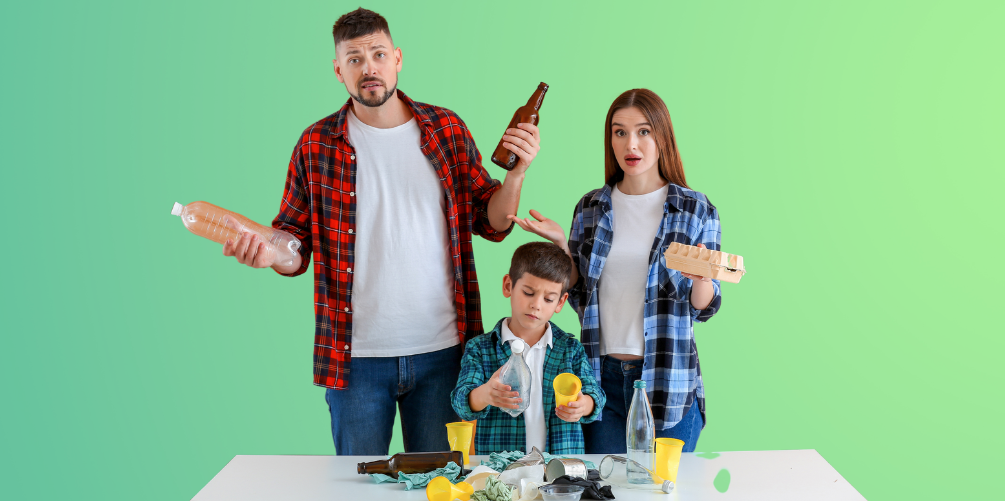Blog
Break The (Wish)Cycle
by Aidan McLennan • June 16, 2022

It’s Time to Toss Wishcycling
Congratulations! With good planning, communication, and promotion you’ve cultivated a community of willing and enthusiastic recyclers. They’re filling their bins with paper, plastic, cans, bottles, and everything that looks like it should be recyclable. Every day, full trucks are rumbling into the recycling center. It’s a good feeling.
So who are you to spoil the excitement by bringing up the uncomfortable fact that 17 to 25 percent of recycling is contaminated? With so many households trying to do the right thing, it can be disheartening to know that a substantial amount of material is hauled directly from recycling to the landfill. Ironically, contamination is often caused by the same people who strive to be responsible recyclers – the wishcyclers.
Make a wish and toss it in
It happens to the best of us. People find themselves standing over the bins, examining an empty package, trying to discern whether it goes into recycle or has to be trashed. It certainly feels better to believe it could be recycled. But it’s hard to know for sure, and that flier with guidelines from the municipality is buried in a drawer somewhere. So they make a wish and toss it into recycling. Surely someone at the other end will know what to do with this mystery package.
That’s wishcycling. It’s not malicious. In fact, it’s hopeful – just not helpful. Most residents want to do the right thing. Unfortunately, wishcycling works against your recycling program, and it has real costs.
We don’t know exactly how much contamination happens because of aspirational recycling, but studies have shown that lowering contamination by one percentage point can save municipalities as much as 90 cents per household each year. We also know that contamination rates have increased by about 10 percentage points in the past decade. If better recycling practices could reduce contamination by 10 percent, municipalities have the potential to recoup $9 per household. Not to mention the positive benefits for the community and the environment.
Digital tools make wishes come true
Your residents want to do the right thing. Now it’s easy to help them recycle confidently and accurately. You don’t expect someone to memorize long materials lists or dig out your annual brochure each time they have a recycling dilemma. So how about an easy-to-use tool they can carry around in their pocket? It’s your custom app that answers their question quickly and does the searching for them. Digital tools can be the cornerstone of your recycling program and a key to addressing wishcycling behavior. Let’s take a look at how this works:
- Make it easy to know what goes where – Give your community a digital recycling tool like Waste Wizard and they’ll have the information they need at their fingertips to make confident recycling choices. No need to search a long list of materials when they have access to real-time, searchable database that’s customized to the capabilities of your recycling program. Waste Wizard from ReCollect also provides feedback on the most searched items to help you fine-tune your education programs.
- Learning sticks when it’s interactive – A great way to help residents recycle right is with the ReCollect Waste Sorting Game. It’s a fun way for people of all ages to test their knowledge and pick up some recycling tips. Meanwhile, you can see which materials cause the most confusion to help you further focus your educational programs.
- The more wishcyclers know, the more they can contribute – When everyone understands the big-picture of recycling in their community, they know how to play their role. Digital tools like the Mobile App from ReCollect allow you to inform and educate residents about how their decisions have impact. Along with reminders and schedule updates, the app allows you to deliver quick tidbits that help take the guesswork out of recycling.
- Reward recyclers with informed feedback – The right digital tools give you the ability to better inform and engage residents. As the community catches on to positive recycling behavior, the feedback you provide will empower them to continue making wise choices. After all, wishcyclers want their actions to make a difference. With the right data and an increasingly successful program, you can show them how they’re contributing to a healthy community and environment.
With digital tools from ReCollect you can build toward a more successful recycling program and help residents be part of making a difference. Waste Wizard, the Waste Sorting Game, and the ReCollect Mobile App can be customized to your needs and they represent an investment of significantly less time and money compared to building similar tools in-house.
Want to learn more? Let’s talk.